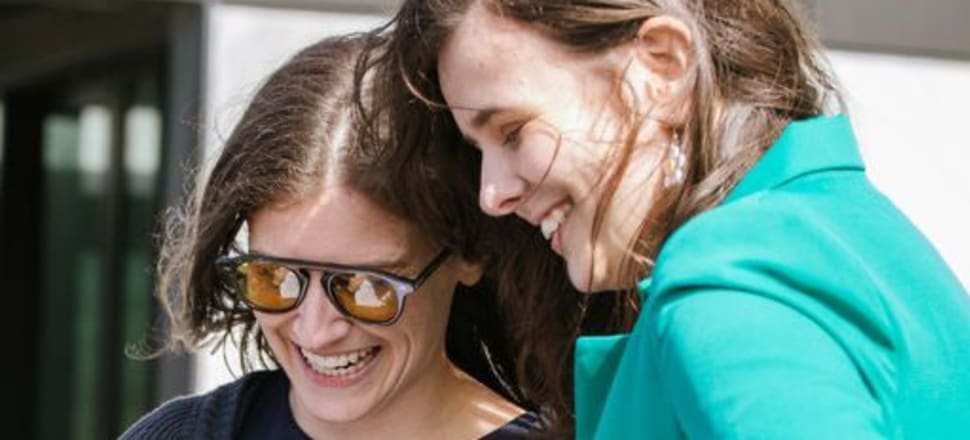
A petition handed to Parliament has the deaf community calling for a fix to sub-par subtitling laws.
Seventeen-year-old Hope Cotton on Tuesday handed a petition with more than 2000 signatures to Green MP Chlöe Swarbrick calling for laws to obligate broadcasters to provide quality captioning for the deaf and hard of hearing community.
Almost a million New Zealanders have access issues to broadcast content due to the lack of a legal requirement to caption - an area where we fall behind many other OECD members.
It’s the second run activists from the disabled community have taken at petitioning the Government to write laws to ensure equitable access, which Cotton said should be a given considering New Zealand's signing of the United Nations Convention on the Rights of Persons with Disabilities in 2008.
Cotton was inspired to start collecting signatures after the pandemic laid out her own access issues in sharp relief. As a deaf person, the move to online learning meant she suddenly needed to rely on captions that generally weren’t provided.
She said when she talked to her deaf friends they had the same problem, but a conversation with a friend across the Tasman revealed it wasn’t that way everywhere.
“Teachers were doing online learning but they weren't making it any more accessible and I started getting really frustrated that there wasn't captioning available for me with school stuff,” she said. “I spoke to a deaf friend in Australia and he said it's never been an issue here as we have these laws in place, and I thought well, we need these laws.”
Since then she’s joined groups like the National Foundation for Deaf and Hard of Hearing’s youth advisory group and youth political collective The Hive.
With a petition that opened for signatures in May and closed at the end of last month, Cotton was on Tuesday finally ready to hand it over on the front lawn of Parliament and let the powers that be take it into consideration.
She said she hoped people could see the importance of making sure her community had access to captions, and that it wasn't just about accessing entertainment, but education and information crucial for safety or taking part in society.
She gave the example of the 1pm Covid stand-ups of the past few years, where despite New Zealand Sign Language interpreters at Jacinda Ardern or Ashley Bloomfield’s right hand, camera feeds were often cut before they could finish signing important information.
Television news would often crop out the signer using footage from the Beehive theatrette. And then there’s the potentially dangerous consequences of poorly-produced captioning. Cotton gave the example of a bulletin from the United Kingdom, which transcribed the words ‘Wear a mask’ as ‘Share a mask’.
In the USA, the Americans With Disabilities Act has been in place since 1990, requiring closed captioning of federally funded public service announcements, overseen by the Federal Communications Commission.
“It would be a real relief for nearly one million people to have these laws in place,” Cotton said.
And with New Zealand’s ageing population, the proportion of the population with hearing difficulties is only set to increase. Reports from the World Health Foundation and the New Zealand Foundation for the Deaf also found the earphone listening habits of young people has the potential to exacerbate this.
Cotton said it wasn't just the deaf and hard of hearing who benefitted from these kind of changes. She contends increasing accessibility makes life easier for everybody, pointing to the invention of the text message - originally designed exclusively for the deaf.
“The disabled community is the largest minority group but it’s also one you can join at any time,” she said. “So if you ignore disability rights and suddenly you’re in a car crash and suddenly you're an amputee, you're a bit screwed.”
It could be a crucial moment for the disabled population, with Whaikaha - the Ministry of Disabled People - launched this year. The ministry has already proven ready to listen, with consultations open to the deaf community around potential changes to the New Zealand Sign Language Act.
Brian Coffey, director of the office for disability issues at Whaikaha said the ministry sought to listen and respond to the views of the disability community.
"We know it’s really important for the disability community to feel they can engage with government, and to do so without facing barriers," he said. "An important part of our work is to support and grow the disability community’s capacity to engage with the whole government system."
Captioning, however, falls between disability issues and broadcasting law. Cotton said she had yet to have a conversation with new Broadcasting Minister Willie Jackson, but said correspondence from the ministry suggested the issue would be examined at the merger of TVNZ and RNZ.
“But that's no legal guarantee, we need laws in place to protect these rights,” Cotton said. “Especially considering the government agreed to give them to us when they signed the UN declaration on the rights of disabled people… and also if Labour isn't in government next year who's to say what will happen.”
The Government ratified the UN declaration back in 2008, which acts as a commitment to providing people with disabilities with all human rights and fundamental freedoms.
But watching her classes go on without being able to take part, Cotton certainly didn’t feel like the declaration was being honoured.
“It really isn't good enough and people have been asking for it for decades,” she said. “We have these rights and you're not giving them to us.
“If America and Australia can do it but we can't, there's something wrong.”







